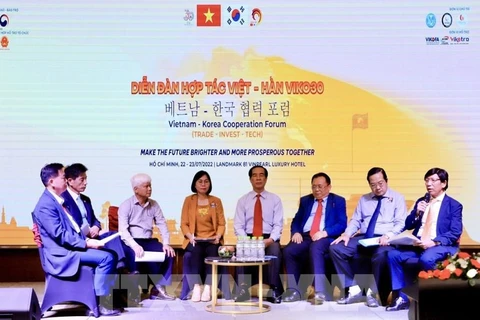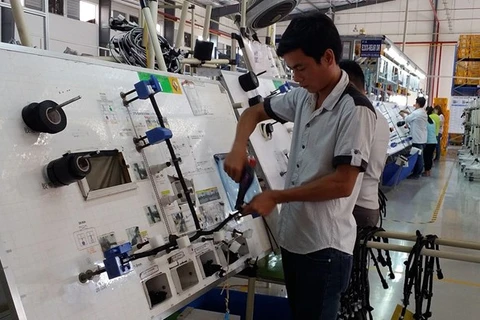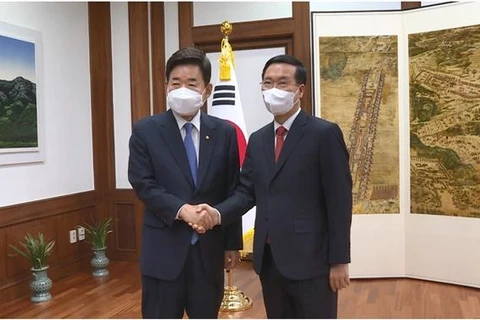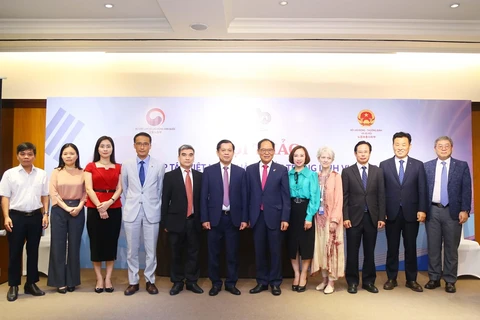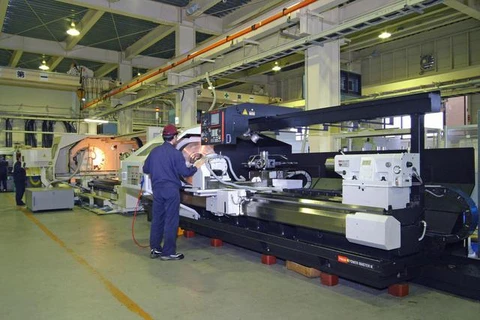Seoul (VNA) – Vietnam needs to have protective policies to encourage companies of the Republic of Korea (RoK) to voluntarily transfer technology to Vietnamese partners through their projects in the Southeast Asian nation, according to a scholar from the Korea Institute for International Economic Policy (KIEP).
In a recent interview granted to the Vietnam News Agency on the upcoming international conference on RoK – Vietnam cooperation, Kawk Sung-il, Director of the KIEP’s security strategy centre, said Vietnamese companies should pay great attention to developing their own technologies in parallel with promoting international cooperation, thus making technology transfer through cooperation with foreign companies operating in the domestic market more effective.
The RoK – Vietnam bilateral relations have developed strongly over the past three decades and reaped fruitful achievements, especially in term sof economics, he said, adding that the two sides need to discuss more cooperation methods to develop sustainably the relations in the future.
According to Kwak, economic cooperation is a bright spot in the bilateral relationship with Vietnam now being the 3rd largest trading partner of the RoK.
In terms of investment, the RoK becomes the largest foreign direct investor in Vietnam. In 2021, due to the impact of the COVID-19 pandemic, the RoK’s investment in Vietnam decreased, but many Korean companies still ranked Vietnam as the most promising country among the ASEAN member nations.
However, the official also mentioned trade imbalance between the two countries, saying that as the two-way trade increases, the imbalance also gradually worsens.
Increasing Vietnam's agricultural exports to the RoK can help resolve the trade imbalance, but this is only a short-term remedy, he said, adding that Vietnam needs to have solutions to attract more investment from the RoK, thus helping Vietnamese companies participate in the RoK’s production network.
If a strong supply chain between the two countries can be formed, the bilateral mutual relationship will be promoted more sustainably, he affirmed.
The official said that Vietnam should promote its production capacity and technology to join supply chains./.
In a recent interview granted to the Vietnam News Agency on the upcoming international conference on RoK – Vietnam cooperation, Kawk Sung-il, Director of the KIEP’s security strategy centre, said Vietnamese companies should pay great attention to developing their own technologies in parallel with promoting international cooperation, thus making technology transfer through cooperation with foreign companies operating in the domestic market more effective.
The RoK – Vietnam bilateral relations have developed strongly over the past three decades and reaped fruitful achievements, especially in term sof economics, he said, adding that the two sides need to discuss more cooperation methods to develop sustainably the relations in the future.
According to Kwak, economic cooperation is a bright spot in the bilateral relationship with Vietnam now being the 3rd largest trading partner of the RoK.
In terms of investment, the RoK becomes the largest foreign direct investor in Vietnam. In 2021, due to the impact of the COVID-19 pandemic, the RoK’s investment in Vietnam decreased, but many Korean companies still ranked Vietnam as the most promising country among the ASEAN member nations.
However, the official also mentioned trade imbalance between the two countries, saying that as the two-way trade increases, the imbalance also gradually worsens.
Increasing Vietnam's agricultural exports to the RoK can help resolve the trade imbalance, but this is only a short-term remedy, he said, adding that Vietnam needs to have solutions to attract more investment from the RoK, thus helping Vietnamese companies participate in the RoK’s production network.
If a strong supply chain between the two countries can be formed, the bilateral mutual relationship will be promoted more sustainably, he affirmed.
The official said that Vietnam should promote its production capacity and technology to join supply chains./.
VNA

